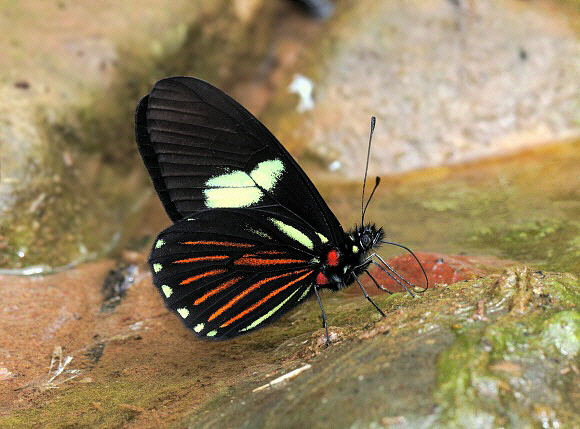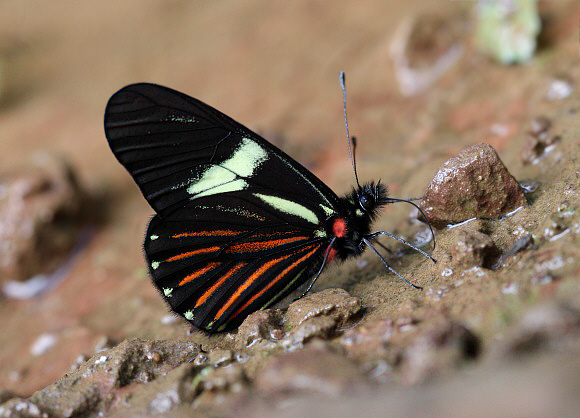 Archonias brassolis negrina, Satipo, Peru – Adrian Hoskins
Archonias brassolis negrina, Satipo, Peru – Adrian Hoskins
Introduction
In the neotropical region there are a total of 192 representatives of the subfamily Pierinae.The genus Archonias comprises of a single species brassolis, which is divided into 11 subspecies.Archonias very strongly resemble certain members of the Heliconiinae and it seems likely that both groups of taxa are involved in a mimicry complex that may also include unpalatable moths in the family Arctiidae. In the case of Archonias brassolis the underside is extremely similar to that of the Heliconiine Laparus doris, and the colour and pattern of the upperside wings is strongly reminiscent of a generalised Heliconiine.
It is probable that Heliconius, Laparus and Archonias are all noxious to birds. If a bird tastes one of them it will associate the butterfly’s colour and pattern with the unpleasant experience. As a result it will sight-reject other similarly coloured butterflies regardless of whether they are toxic or palatable. Palatable butterflies that mimic noxious ones are called Batesian mimics. In cases such as Archonias and Heliconius where several ( often unrelated ) noxious species share a similar warning pattern they are known as Mullerian mimics.
While birds are easily fooled by the similarities between Archonias and the aforementioned insects, they can easily be distinguished from each other by human observers. Archonias like all members of the Pieridae have 3 pairs of legs. Heliconius and Laparus however are members of the Nymphalidae and thus have only 2 visible pairs, as the front pair are reduced to very short stumps. The shape of the wings is also much more elongated in Heliconius and Laparus.The various subspecies of Archonias brassolis are variously distributed from Mexico to Paraguay. The race negrina is restricted to southern Amazonia, including Peru, Mato Grosso ( Brazil ), Bolivia and northern Argentina.
 Archonias brassolis negrina, Pauti, Junin, Peru – Adrian Hoskins
Archonias brassolis negrina, Pauti, Junin, Peru – Adrian Hoskins
Habitats
This species is found in rainforest and cloudforest habitats at altitudes between about 300-1200m
Lifecycle
The early stages are unknown.
Adult behaviour
The butterflies are usually encountered singly or in low numbers. Males are typically found amidst aggregations of Heraclides, Laparus and other species, imbibing water from the edges of puddles, seepages or small streams. They can sometimes be seen perching on low foliage in forest edge habitats, and often use the same perch for several days in succession.
Both sexes visit Eupatorium and other flowers for nectar, and keep their wings closed while feeding. On overcast days however they will bask for long periods on low vegetation with their wings fully or partially outspread.
